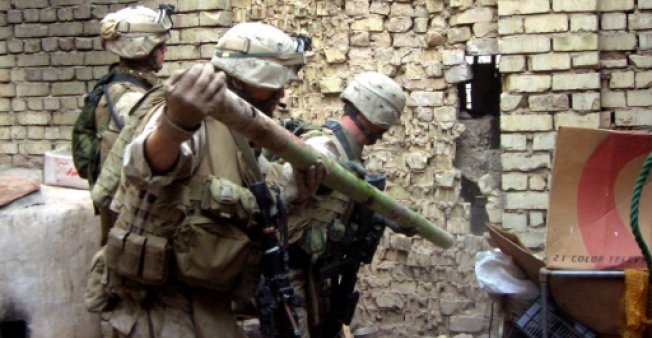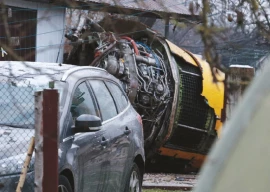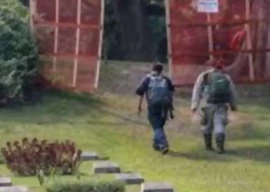
Insurgents had jammed several 155mm artillery shells into a manhole on a street in Ramadi, central Iraq, then triggered a blast that ripped through the patrol's final Humvee, killing a Navy medic and three of Carlisle's Marine Corps comrades - including his best friend.
"Within 18 hours, we were back out on our next mission," Carlisle said of the April 2, 2006 attack.
"We didn't have time to process it. You couldn't sit there and dwell on what was going on because you still had to get up and go and fight the next day."
Carlisle, from Ohio, is now among the millions of veterans dealing with Post-Traumatic Stress Disorder, or PTSD, a signature wound of any war but especially prevalent after the brutal urban fighting in Iraq.
Kuwait's first film on Iraq invasion to make local debut
George W Bush launched that conflict 15 years ago this month, but in some ways its toll is only in its early phases.
During two deployments to Ramadi and Fallujah, Carlisle said his unit of about 800 men lost 25 Marines and sailors, with another 350 wounded in action.
Since coming home, at least a dozen more have killed themselves or died of drug overdoses.
"It's not until you get out and you are not with your tribe anymore that you start realizing you have some serious issues," the former Marine infantryman said.
Estimates vary, but the US Department of Veterans Affairs (VA) believes about 13-20 per cent of Iraq War vets suffer from PTSD.
Symptoms can range from insomnia and depression to debilitating panic attacks, flashbacks, irritability and self-harming behavior.
Like many of his buddies, it took Carlisle time to seek help for his condition, only going to see a doctor in 2012 - four years after leaving the military.
He was given five different types of medication, and worries the VA dishes out pills too readily.
"I don't want to see them keep pushing medications to veterans. That should be, in my mind, the last line of defense," he said, noting that alternative approaches including meditation have helped him more.
Iraqi PM declares 'end of war against IS' in Iraq
Carlisle runs a non-profit organization - 3/8 Veterans of Fallujah and Ramadi - advocating for fellow veterans, and he's about to start another group to run retreats for combat veterans.
Paula Schnurr, executive director of the VA's National Center for PTSD, said that while treatment is often through anti-depressants, the preferred recourse comes through various types of psychotherapy.
In 2006, the VA started training clinicians in techniques such as cognitive-processing therapy, where a patient learns about and processes their trauma. The VA also uses other methods aimed at desensitizing a veteran.
Schnurr, who has been studying PTSD since 1984, said treatments have come a long way over the past decade and in many cases it is effectively curable.
"We have treatments for PTSD ... it doesn't have to be a chronic disorder," Schnurr said.
The National Center for PTSD runs a project called About Face encouraging veterans to seek treatment, and is increasingly using "tele-therapy" to offer web-based counseling to vets without easy access to a VA center.
Mark Russell, director of Antioch University's Institute of War Stress Injury, Recovery and Social Justice, said the VA's response to veterans' PTSD has been inadequate, arguing that war-related psychological conditions still go under-diagnosed.
"If you look at the whole spectrum - depression, anxiety, medically unexplained physical conditions - those folks aren't being addressed," Russell said, noting the number of veterans suffering some level of psychological trauma is really more than 50 per cent.
"It's a time bomb," he said.
The nature of the Iraq War ensured high levels of PTSD, as it was not uncommon for soldiers to deploy four or five times.
Iraq banks on private sector for post-Islamic State reconstruction
The cumulative stress of repeat missions, combined with urban fighting with an enemy hidden among civilians, has left deep mental scars.
"Ten years removed, I see all kinds of indicators and warning signs," Carlisle said.
"Guys were doing crazy stuff but it made sense because everybody is having the same feelings and having the same thoughts. It was normal to us."
The VA doesn't track the overall number of Iraq veterans, but according to Brown University's Watson Institute, 2.7 million troops served in Iraq and Afghanistan between 2001 and 2014.
Despite drawdowns in both countries, there are still about 9,000 US troops in Iraq and some 14,000 in Afghanistan.
If history is a guide, the psychological toll on America's young veterans will only worsen.
Since the end of the Vietnam War, where more than 58,000 Americans were killed, several times that number of veterans have taken their own lives.
Larry Shook, a Washington state native who was a machine gunner on a helicopter gunship in Vietnam from 1967-1968, said American leaders still have not learned the lessons from that war.
"The taboo against killing is the most deeply embedded behavioral taboo in the human psyche ... Training for combat changes your personality," said Shook, who writes frequently about veteran issues.
"You can't take that young man, pat him on the back, say thank you for your service, here are a few ribbons, you did a good job and return him to civilian life and expect him to have a normal happy functional human life. His brain is not capable of that."



1732623521-0/bitcoin-(1)1732623521-0-165x106.webp)

1732618327-2/Untitled-design-(7)1732618327-2-270x192.webp)











COMMENTS
Comments are moderated and generally will be posted if they are on-topic and not abusive.
For more information, please see our Comments FAQ